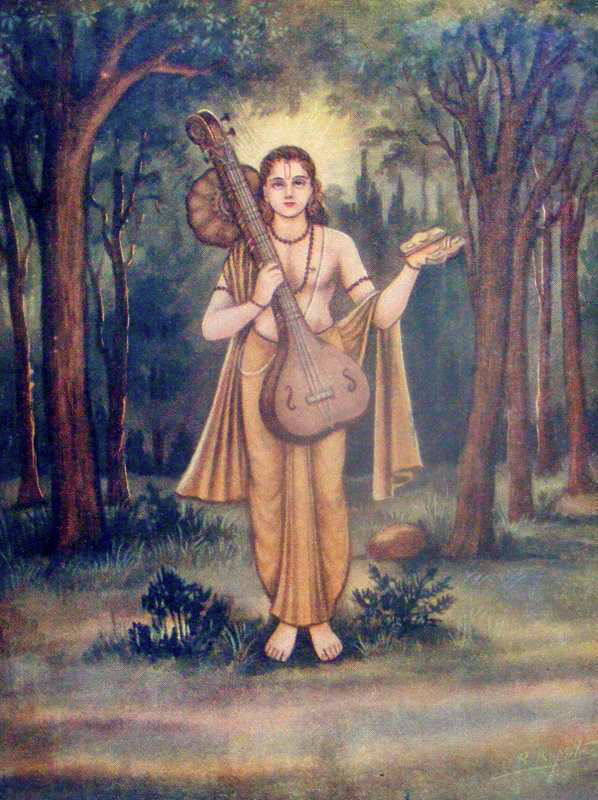Narada Maharshi is an epic character noted for doubts management. He used to propagate Narayana mantras, consisted of four letters. By playing his Tamburi {a guitar like musical instrument, having fretted with three Turkey strings} in tune of this mantra, he campaigned for Dharma and always travelled to the palaces of Asuras or Devas or even to any people in this world.
॥ नारायण नारायण नारायण ॥

Lord Vishnu is the father of Narada Maharshi and Goddess of wealth, Lakshmi is his mother. Lord Vishnu had taken twenty one round tours circumscribing the entire world, in order to protect the innocent people and give the capital punishment to the persons engaged in illegal actions, holding an axe, in disguise as a man with a name of Parasurama, or Asura Mardana. Narada Maharshi felt proud of his father.
Initially, he was moving and chanting with Narayana mantra bare handed without any tunes. Then nobody heeded any attention to him. He consulted his father and got advised to accompany with a Tamburi. In order to enhance the melody of the tunes, he desired to fret it with best quality of strings and as usual to a child, he demanded it with his mother.
His mother, Goddess Lakshmi narrated him his father’s performances and findings. She told him that after finishing the twenty first round of his father’s tour, his father selected one hundred able and innocent people from India and posted them at one hundred different nations around the world and advised them to continue to live happily. These people are later called Sourastrians and they wanted to worship him always in token of thankfulness as Asura Mardana. He agreed but he desired to get performance of Yajna by them for which fire is significance.
यज्ञो वै विश्णुः ॥ ॥ यजुर्वेद ॥
Thereafter, all Sourastrians followed fire worship and Goddess Lakshmi fell under an obligation of provision of wealth and happiness to them always. Sourastrians worked hard as usual for a faithful man and developed advanced skill in various branches of science. They gifted a wheel to God Vishnu of best quality metal and thus they may be able to provide strings of a better quality to his Tamburi. After bowing down his head to his mother Narada, Maharshi immediately took leave of her in search of the good metallic strings. He found fire worshipping people in today’s Turkey and remembered his father, Narayana. He succeeded in fretting his Tamburi with good quality of strings from Sourastrians.
Narada Maharshi and Mahabharata
Before starting of writing the epic Mahabharata, VedaVyasa Rishi could not get a suitable initiating word to commence with the verses. He consulted Narada Maharshi and only upon his advice of Narayana manthra, VedaVyasa Rishi started narrating the verses and Lord Ganesha went on writing them.
नारायणं नमस्कृत्य नरं चैव नरोत्तमं । देवीं सरस्वतीं ततो जयमुदीरयेत् ॥
The meaning is, ‘In reverence I prostrate the best of the best people, Narayana, Goddess Saraswathi, and then may be uttered the word Jaya which means victory’.
Story of Hiranyakasupu
In order to devout God, his name must be remembered. Forgetting God is quite natural to people on this earth. The demon Hiranyakasupu was given a choice in his life i.e. either to hate God Vishnu or to devout him with love. He selected the method of hatred. The enemy may not be forgotten at any cost. Let God Vishnu be the enemy, then he would be remembered always. Hence, Heranyakasupu after his marriage with Kayadhu, desired and also ordered his wife to hate God Vishnu.
Narada Maharshi reached the Palace of Hiranyakasupu. The queen, Kayadhu was pregnant. Narada Maharshi is so clever, and in that Palace, he played melodiously his Tamburi chanting the Narayana Mantra, to be heard only by Kayadhu, but without letting the king Hiranyakasupu know.
Birth of Prahlada
Later, the child born was named as Prahlada and from the childhood onwards, Hiranyakasupu forced it to develop hatred towards God Vishnu continuously. Since his son, Prahlada heard the Narayana Mantra prior to birth, he started love and devotion before God Vishnu. Hiranyakasupu became furious and ultimately tried to murder Prahlada.
Hiranyakasupu himself had a boon to avoid his death. Neither a human being nor an animal could kill him. Neither in the day nor in the night would he be killed. Neither inside the room nor on the outside verandah would he be killed. The disturbance to the existence of Prahlada became unbearable. Narada Maharshi reported to his father and requested to relieve Prahlada from the sufferings. Lord Vishnu assured his son, Narada Maharshi about the protection of Prahlada.
परित्राणाय साधूनां विनाशाय च दुश्कृतां । धर्मसंस्थापनार्थाय स॑भवामि युगे युगे ॥
This means, ‘In order to ensure the safety and wellbeing of my believers, also to eliminate the criminals, and for the sake of the establishment of Dharma, again and again in every Yuga, I take birth in this world which is called incarnation of God’.
Narasimha Avatar
One evening, the angry king, Hiranyakasupu, was about to kill the boy. He was outside on the verandah near the pillars. Suddenly, everybody was shocked to see one of the pillars breaking and emerging out of it, one strange, fierce living figure having lower part as human being and upper part as that of a lion. Swiftly, this living figure held the king Hiranyakasupu and carried to the door step, and sat on the middle plank, and started to pullout the intestines of Hiranyakasupu. Prahlada was holding his hands prostrated and chanting Narayana Mantra continuously. This figure was the incarnation of Lord Vishnu called Narasimha and it finished Hiranyakasupu by eating his body.
Narada Maharshi has played many roles as a messenger of doubts and the aim behind these actions were the preservation of Dharma in this world.
Readers are free to provide feedback, may ask any questions for the sake of general knowledge. Frequently browse this website to read more interesting articles. Anybody is free to forward this website link to friends and family.

Very informative
Thank you for the kind feedback. Please keep visiting and feel free to share the articles.